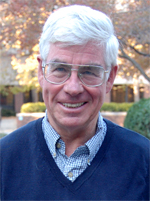Professor John Grutzner retires after more than 40 years at Purdue
2012-12-25

Professor Emeritus Organic Chemistry
After more than forty years at Purdue, Professor John Grutzner retired in December 2012. During that time he relished the balance between chemical innovation and education. “My working philosophy has been that teaching without research and research without teaching are sterile activities,” he said.
Grutzner’s interest in chemistry was cultivated in high school with sage advice from one of his teachers. “Mr. Brumley advised me to ‘take science – you can learn humanities later,’” he remembered. And another influential teacher, Dr. Withers, taught him the wonders of acids and bases.
Then it was off to Melbourne University where Organic Chemistry was a memorization exercise and boring. “My wife, Jocelyn, got a significantly higher grade than me in our first year of organic,” Grutzner remembered. It was the arrival of Professor Lloyd Jackman as the new Professor of Organic Chemistry which sparked Grutzner’s interest in an organic career. “Jackman opened the treasure boxes of mechanism and NMR. Magnet shimming involved cranking a large handle to move the electromagnet poles and chemical shifts were measured by averaging five sweeps in each direction,” he said.
After completing a Ph.D. in 1967, Grutzner says his post-doctoral years showed him what chemistry could be. He studied with two giants – Saul Winstein (UCLA) and John D. “Jack” Roberts (Caltech). This was the pinnacle of classical Physical Organic Chemistry with the non-classical ion debate in full swing. “Those legendary Thursday night seminars at UCLA combined the intellects of Anet, Cram and Winstein, with periodic appearances by George Hammond and Roberts. Two and three hour sessions of intense debate were the norm and ‘speakers’ were among the top chemists from around the world,” he added.
Reflecting on his arrival at Purdue in 1969, Grutzner remembers that the department had no lasers and the spinning-band distillation column was the most prized piece of organic equipment. “Organic seminars were held on Saturday mornings with all the faculty sitting in the front of the room, followed by lunch together,” he said. Grutzner is impressed with the advancements he has witnessed over the years. “When Graham Cooks arrived, his instrument filled a whole basement room and now he holds it in his hands,” he said.
Grutzner points out one constant in the department over the past forty years. “The stream of top quality undergraduates remains one of our greatest assets and resource for the future, because an educated citizenry is essential for our democracy. However, I am concerned about the decreasing attention span and ability of students to memorize,” he added.
Whether guiding COOP applicants and undergraduates through career decisions or witnessing the productive careers of his Ph.D. students, Grutzner considers interaction with students as his greatest accomplishment.
Grutzner jokes that his first retirement project will be to ‘find my desk’! He and his wife, Jocelyn, plan to spend time with their grandchildren, do a lot of traveling, and become volunteers in the community. “I also have a few unfinished research projects that I plan to bring to fruition,” he added.
Grutzner is always quick to acknowledge the help he received from his research group, departmental staff, and colleagues. “I especially want to thank the staff from janitors, Chemistry shop, Amy and NMR facility staff and secretaries for their hard work and constant, often unrecognized, contributions. They are the heart of the department and we can’t live without them; I have been greatly blessed, thank you and bless you all,” he said.